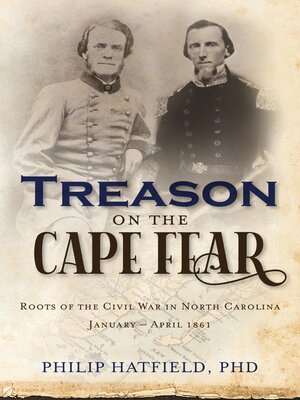Treason on the Cape Fear
ebook ∣ Roots of the Civil War in North Carolina, January-April 1861
By Philip Hatfield

Sign up to save your library
With an OverDrive account, you can save your favorite libraries for at-a-glance information about availability. Find out more about OverDrive accounts.
Find this title in Libby, the library reading app by OverDrive.



Search for a digital library with this title
Title found at these libraries:
| Library Name | Distance |
|---|---|
| Loading... |
Although rarely discussed by historians, events on North Carolina's southeastern coast during the months of January to April 1861 challenge the popular narrative that the Civil War began with President Abraham Lincoln's call for 75,000 volunteers following the attack on Fort Sumter. Treason on the Cape Fear demonstrates that hostilities were already in progress well before Lincoln's inauguration on March 4, 1861.
Shortly after South Carolina's secession on December 20, 1860, President James Buchanan announced his intention to strengthen southern coastal forts. This agitated North Carolina's southeastern coastal residents' already tense mood, with fears of imminent invasion. However, when the Wilmington Journal falsely reported that Buchanan had sent two U.S. steamers carrying heavy artillery and soldiers to secure Fort Caswell, located south of the port city on the Cape Fear River, tensions escalated to the point of no return.
On January 10, 1861, Wilmington city leaders ordered three hundred local militia deemed "The Cape Fear Minutemen" to capture Fort Caswell and Fort Johnston, without authorization from the Federal government, a blatant act of treason. Despite this, no legal action was taken as North Carolina Governor John W. Ellis simply apologized to President Buchanan and ordered the militia to immediately surrender the forts. Following the bombardment of Fort Sumter on April 12, 1861, however, Ellis ordered the militia to recapture the forts, and this time no apology was given.







